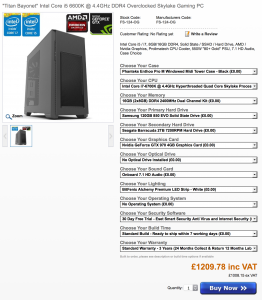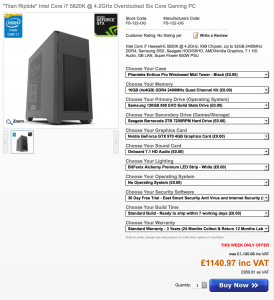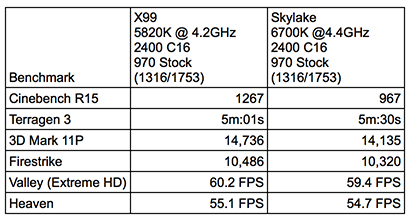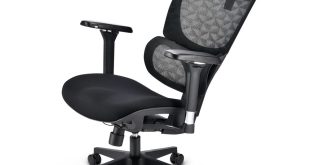You will likely have already read our coverage of Intel's Skylake earlier this week – you can recap HERE. How does a comparatively spec'd/priced X99 system compare against Skylake ? Do the two additional processing cores on the 5820K make much of a difference against 6700k?
My colleague Luke did delve into the subject already on THIS page however Overclockers UK wanted to highlight some of the benefits of a competitively priced X99 system (this very one we are testing today). They supplied benchmark figures from the X99 and Skylake system – both of which are available to buy directly from their website. Price points are very close indeed – see below.
We need to point out with complete transparency, the figures on this specific page were supplied directly by 8PACK in Overclockers UK (we don't have the Skylake system in our labs). That said, Ian ‘8PACK' Parry is a renowned world class overclocking and benchmarking pro, so we have no reason to question his results.
Now it is worth pointing out that Overclockers UK have a tendency to change their pricing on a fairly regular basis, so we took screenshots below with both systems specified with the same amount/speed of memory (16gb 2400mhz), hard drive, SSD and GTX970 graphics card.
“Titan Riptide” Intel Core i7 5820K @ 4.2GHz Overclocked Six Core Gaming PC – buy and customise HERE.
“Titan Bayonet” Intel Core i5 6700K @ 4.4GHz DDR4 Overclocked Skylake Gaming PC – buy and customise HERE.



8PACK's Cinebench R15 results closely match our own published earlier in this review (within the variable of a simple rerun). A good ‘confirmed' baseline to take from the first test.
The 5820K completes the Terragen 3 run 29 seconds faster than the 6700k system, even with a clock core disadvantage of 200mhz (4.2ghz v 4.4ghz). As we would expect, the extra cores, even under a clock deficit still drive a 6% speed increase.
Synthetic 3D performance is very closely matched in Firestrike, Valley and Heaven benchmarks. Gaming performance is going to be very closely matched between the two systems, however when the processor is heavily called upon, the benefits of the extra 2 cores come into play.
 KitGuru KitGuru.net – Tech News | Hardware News | Hardware Reviews | IOS | Mobile | Gaming | Graphics Cards
KitGuru KitGuru.net – Tech News | Hardware News | Hardware Reviews | IOS | Mobile | Gaming | Graphics Cards



Still trying to see the point in Skylake
beyond a SFF setup, yeah, unless someone were completely diving in for the first time on a desktop. as an upgrade to an existing quad core…not so much.